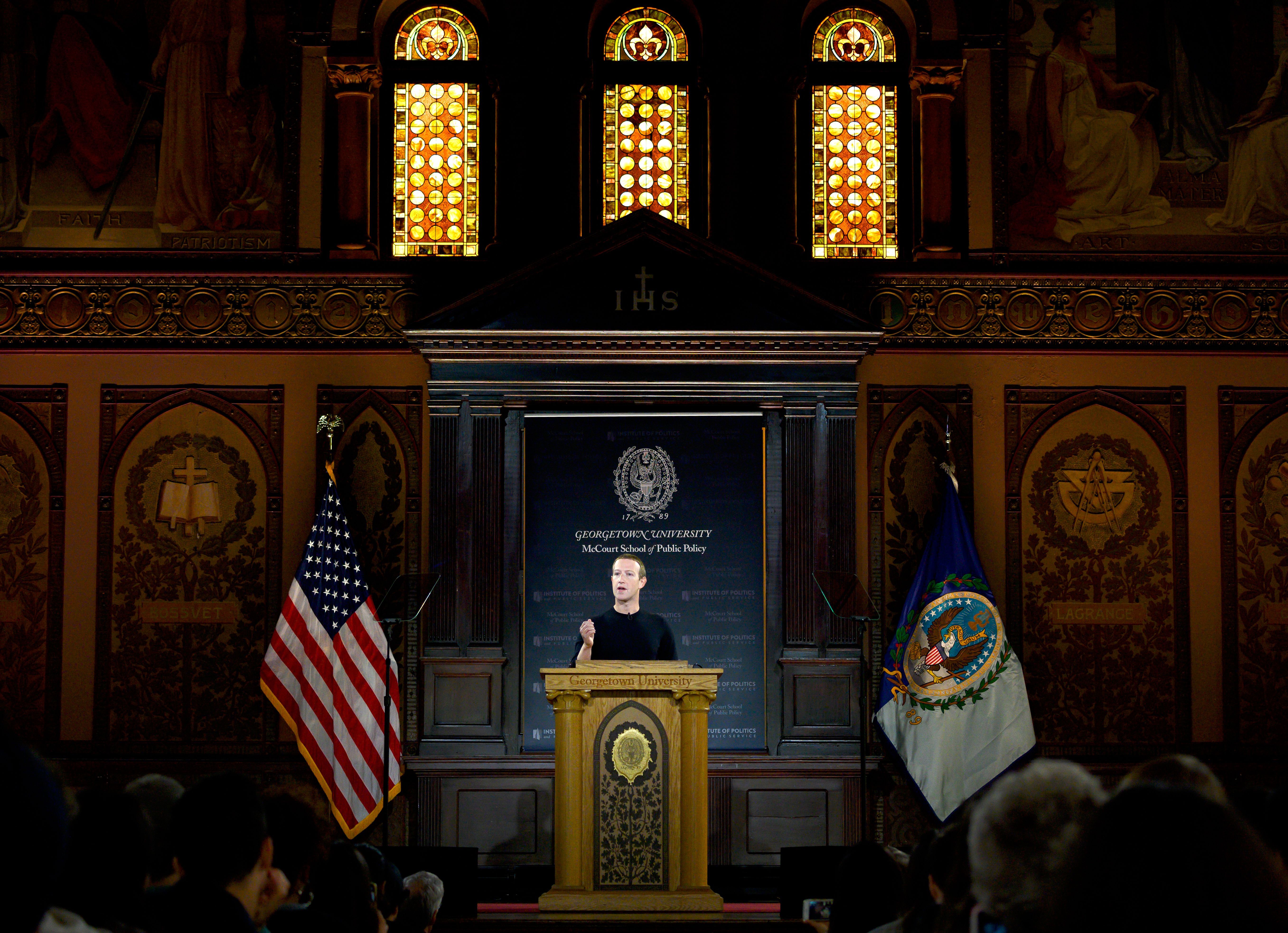October 18, 2019
🎬 Situational awareness: For the return of "Axios on HBO" on Sunday, I traveled to Salt Lake City to interview Sen. Mitt Romney, and to Berkeley for a whiteboard session with the economists behind Sen. Elizabeth Warren's "ultra-millionaire tax."
- Plus, Axios' Dan Primack goes behind the scenes of esports.
See a clip from my interview with Sen. Romney.
- I hope you'll tune in Sunday at 6 p.m. ET/PT on HBO.
1 big thing: Trump's shout-it-out loud strategy

Illustration: Aïda Amer/Axios. Photo: Alex Wong/Getty Images
The Trump administration is testing a novel strategy for dealing with controversy and possible illegalities: Pretend you have nothing to hide by blurting it out loud.
- Why it matters: President Trump and his aides and allies seem to think that by being unapologetic and admitting things that would have touched off blazing scandals just a few years ago, they can move the goalposts of what's acceptable to Republicans and the public.
We had two doozies yesterday:
1) Acting White House chief of staff Mick Mulvaney just said it out loud at a White House briefing, connecting Trump's release of Ukraine aid with an investigation of corruption that included U.S. Democrats.
- ABC's Jonathan Karl pressed: "[T]o be clear, what you just described is a quid pro quo. It is: Funding will not flow unless the investigation into the Democratic server happens as well."
- Mulvaney replied: "We do that all the time with foreign policy."
- This, of course, pulverized Trump's "no quid pro quo" mantra.
- The subtext of the pivot was: Own it. So what? He's allowed. He's the president. There's no coverup.
- Republicans on the Hill couldn't believe it. A House GOP committee source to Axios' Alayna Treene: Mulvaney's "diatribe has blown up the [Gordon] Sondland interview — Democrats are referring to the transcript mid-interview. WTF."
- After headlines like "White House admits quid pro quo over Ukraine aid," Mulvaney tried to walk back the admission with a statement blaming the press: "Once again, the media has decided to misconstrue my comments to advance a biased and political witch hunt against President Trump. Let me be clear, there was absolutely no quid pro quo between Ukrainian military aid and any investigation into the 2016 election."
2) Amid rising charges of cronyism, Trump awarded one of his own resorts, Trump National Doral near Miami, the lucrative contract for next June's G7 summit.
- The Miami Herald calls it "a surge of off-season business for the lagging property."
- Republicans would have howled "self-dealing" if a Democrat did anything like that.
We've seen the shout-it-out-loud strategy before:
- Trump released the rough transcript of the Ukraine call, the very event that touched off the formal impeachment investigation, and called it "perfect."
- Trump, accused of asking Ukraine to investigate the Bidens, went on camera and asked Ukraine and China to investigate the Bidens.
- Trump says he doesn’t care if Russia and Syrian President Bashar Assad move in and take America’s place in northern Syria.
Between the lines ... Last week's gambit was: "There is no whistleblower. There is no impeachment." From nothing to everything. Welcome to "The Trump Show."
2. Mark Zuckerberg: People are the Fifth Estate

Mark Zuckerberg spoke in public in Washington yesterday for the first time since his congressional testimony a year and a half ago, telling Georgetown students that the three biggest threats to free expression are:
- Legal: "Laws and regulations around the world that undermine free expression and people's human rights."
- "[T]he platforms themselves — including us."
- Cultural: "[T]he impulse to restrict speech and enforce new norms around what people can say."
By admitting that Facebook is part of the problem, Zuckerberg is trying to help defuse attacks from both the left and right.
- In a pre-speech interview, Zuckerberg told me Facebook has a responsibility to "design systems that can help expose the diversity of ideas, and that don't encourage polarizing content and clickbait and things like that. And we take that very seriously."
Go deeper: "Mark Zuckerberg doubles down on free speech," by Axios' Scott Rosenberg.
3. Transportation's make-or-break moment

Illustration: Eniola Odetunde/Axios
The modernization of cars, trucks, planes and public transit could be one of the greatest re-orderings of civilization since the dawn of the horseless carriage, write Axios' Joann Muller and Alison Snyder.
- However, that vision is being challenged by technical hurdles, crumbling infrastructure and a stalled-out federal government that has yet to create standards and regulations for the coming changes.
What's next: The specter of disruption is triggering enormous R&D investment by automakers fearful of becoming the next Kodak, Blockbuster or Blackberry.
- They're all chasing a multi-trillion-dollar global market of self-driving cars and electric vehicles that Boston Consulting Group says is worth $380 billion in profits.
🚗 ✈️ 🚄 Sign up for Joann Muller's weekly look at the changing transportation industry, Axios Navigate.
4. "No religion" rising
The share of Americans with no religious affiliation is rising significantly in tandem with a sharp drop in the percentage that identifies as Christians, AP's David Crary writes, based on new data from the Pew Research Center.
- Based on telephone surveys conducted in 2018 and 2019, Pew said 65% of American adults describe themselves as Christian, down from 77% in 2009.
- The group that identifies as atheist, agnostic or "nothing in particular" — often referred to as the "nones" — now stands at 26%, up from 17% in 2009.
Both Protestants and Roman Catholics are losing followers:
- Pew said 43% of U.S. adults identify as Protestants, down from 51% in 2009.
- 20% are Catholic, down from 23% in 2009.
5. Teen suicide rates on the rise


What's new: The number of suicides from people ages 10 to 24 increased 56% from 2007 to 2017, the fastest rate of any age group, a new CDC report shows, writes Axios' Marisa Fernandez.
- Suicides are disproportionately affecting people of color and those in the LGBTQ community.
6. How they see us: "It will take years to mend"

From the lead editorial of The Economist:
The pithiest summary of Donald Trump’s foreign policy comes from the president himself. Referring to the mayhem he has uncorked in Syria, he tweeted: "I hope they all do great, we are 7,000 miles away!" Mr Trump imagines he can abandon an ally in a dangerous region without serious consequences for the United States. He is wrong. The betrayal of the Kurds will lead friends and foes to doubt Mr Trump’s America. ...
Human rights, democracy, dependability and fair dealing, however patchily honoured, are America’s most powerful weapon. If China and Russia had their way, might would be right. For the West, that would be a profoundly hostile world.
7. Career diplomats sound warning on Trump
Some of America's most seasoned diplomats are warning that President Trump is severely wounding American diplomacy, writes Axios World editor Dave Lawler.
- Why it matters: "When you hollow out the State Department, when you diminish diplomacy, you are taking away an essential tool of power of the United States," says Wendy Sherman, who served in top State Department roles in the Obama administration.
Driving the news: This rift is increasingly going public as career diplomats like Michael McKinley, Marie Yovanovitch and George Kent discuss Trump's Ukraine policy before the House's impeachment inquiry.
8. The talk of California: A creeping fault

Residents of Ridgecrest, Calif., inspect a fault rupture in July. Photo: Mario Tama/Getty Images
"A major California fault capable of producing a magnitude 8 earthquake has begun moving for the first time on record," thanks to geological shifts after a series of quakes near Ridgecrest, Calif., earlier this year, reports the L.A. Times' Rong-Gong Lin II.
- Why it matters: It ends "a persistent myth that circulates in California and beyond — that quakes like the Ridgecrest temblors are somehow a good thing that makes future quakes less likely. In fact, earthquakes make future earthquakes more likely."
A major quake on this fault could "destabilize the San Andreas ... [causing] the worst shaking the Southern California region has felt since 1857, and [sending] destructive tremors through Los Angeles and beyond."
9. First look: Rescuing the unwelcome

The New Republic's November cover story, "Treading Water," features writer Ben Ehrenreich’s journey as a crew member on a rescue ship searching for immigrants stranded in the Mediterranean Sea:
- "Since the beginning of 2014, nearly 19,000 people have died attempting to cross the Mediterranean Sea [from the Middle East and Africa] to Europe. Untallied others disappear without a trace."
- Why it matters: "[T]he Mediterranean is now the deadliest border on Earth, a boundary between two worlds, one guarded for the rich, the other suffered by the poor."
10. Reader pic of the week
Taken by Charlie Hurt at Nationals Park:

📱 Thanks for reading Axios AM. Please invite your friends to sign up here.